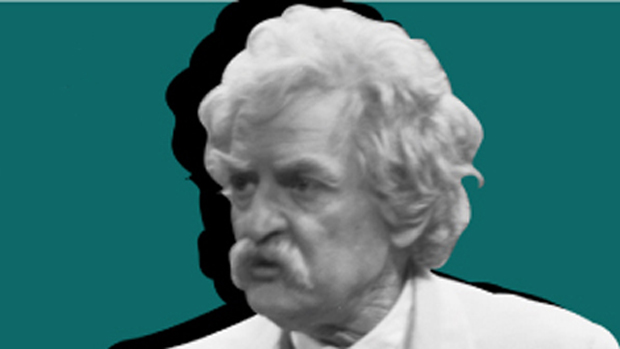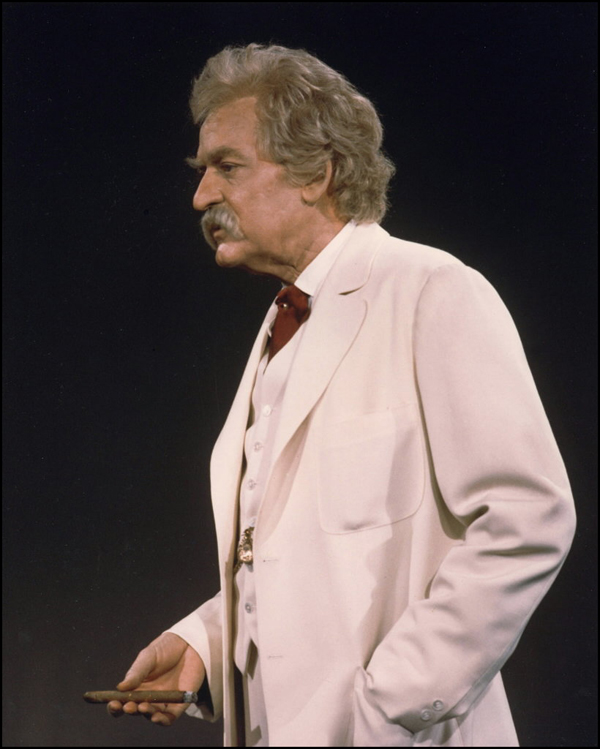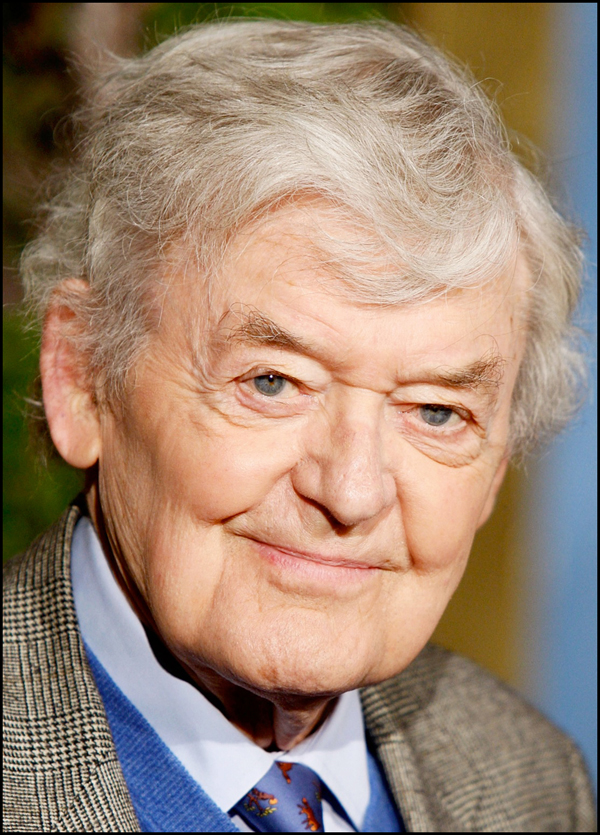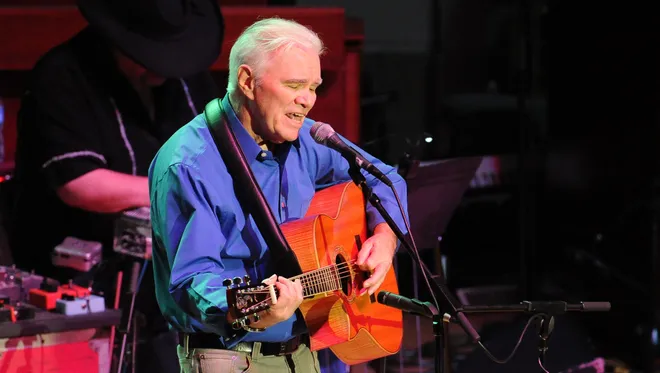
 When the calendar turned to 2014 it laid down a milestone for the longest running show in American Theatre history—the 60th year for Mark Twain Tonight! Clive Barnes of The New York Times reviewed Hal Holbrook’s third New York engagement in 1977: “Hilariously funny. We see him not as the precursor of Will Rogers or even H.L. Mencken, but clearly as a prototypal Lenny Bruce, so anti-establishment you wonder why they allowed him into his century.” Holbrook has shown us Mark Twain the social critic, whom George Bernard Shaw called “America’s Voltaire.”
When the calendar turned to 2014 it laid down a milestone for the longest running show in American Theatre history—the 60th year for Mark Twain Tonight! Clive Barnes of The New York Times reviewed Hal Holbrook’s third New York engagement in 1977: “Hilariously funny. We see him not as the precursor of Will Rogers or even H.L. Mencken, but clearly as a prototypal Lenny Bruce, so anti-establishment you wonder why they allowed him into his century.” Holbrook has shown us Mark Twain the social critic, whom George Bernard Shaw called “America’s Voltaire.”
The show never stops evolving. In its 60th year, three new numbers are adding another hour to its revolving repertoire of material: one on the Christian Bible, another from the feuding clans in Huckleberry Finn killing each other off, and another on the fate of the laboring class in America. “Mark Twain never stops surprising me,” says Holbrook. “He’s kept me fired up and asking questions most of my 89 years.”
It was a fateful decision for Holbrook when he sat at his desk in a small $79 a month New York apartment in 1954 and began searching Twain’s writings for material that might work on the stage. One key decision he made: portray Mark Twain as the aging character the world knows—a wild white head of hair, beetle brows and moustache, the white suit, and never break the illusion that it is Twain himself speaking in his own time. The audience will update him. That has made the show more powerful because human behavior doesn’t change. Neither does its foolishness. That’s the joke.
This total disguise of himself, which took as much as four hours when he was younger, has given Holbrook the benefit of another career as himself in motion pictures like Magnum Force, Wall Street, Creepshow, Water for Elephants, Lincoln, and Into the Wild for which he received an Academy Award nomination. Television films and series earned him five Emmy Awards, a total of twelve nominations. With ninety-eight stage plays in New York and regional theatres around the country, he has been known to say “I’ve been on the road most of my life.”
He is not a Hollywood actor or a New York actor. He’s as much an American actor as any in our theatre’s history because he has never stopped touring America coast to coast in 66 years since graduating college in Ohio and setting out for Texas on the school assembly circuit with Ruby Holbrook, his first wife. The solo Twain was originally created in a Greenwich Village nightclub, where Ed Sullivan saw him and first gave him national television exposure. Three years later an unheralded 34-year-old actor debuted Mark Twain Tonight! just off Broadway to critics who had no idea what to expect. The New York Times: “There should have been posters up all over town to herald his arrival. Mr. Holbrook’s material is uproarious, his ability to hold an audience by acting is brilliant.” It was called “one of the treasures of the American Theatre” by Life Magazine. Seven years later he played New York again, won the Tony Award and Mark Twain Tonight! was seen on CBS Television before 30 million people.
 Hal Holbrook was born in Cleveland in 1925. When he was two his mother disappeared, his father followed suit, and young Holbrook and his two sisters were raised by their grandfather in South Weymouth, Massachusetts, where his people had settled in 1635. He was sent away at the age of seven to one of the finer New England schools, beaten regularly by a Dickensian headmaster, and at twelve was sent to Culver Military Academy where he discovered acting as an escape from rigid authority. He believes Culver saved his life.
Hal Holbrook was born in Cleveland in 1925. When he was two his mother disappeared, his father followed suit, and young Holbrook and his two sisters were raised by their grandfather in South Weymouth, Massachusetts, where his people had settled in 1635. He was sent away at the age of seven to one of the finer New England schools, beaten regularly by a Dickensian headmaster, and at twelve was sent to Culver Military Academy where he discovered acting as an escape from rigid authority. He believes Culver saved his life.
After three years in World War II, Holbrook completed his college education at Denison University in Ohio, where the Mark Twain characterization grew out of an honors project which gave him and his young wife an immediate job after graduation, playing scenes from Shakespeare to Twain on the school assembly circuit in the Southwest.
His first solo appearance as Twain was at the Lock Haven State Teachers College in Pennsylvania in 1954, a desperate alternative to selling hats or running elevators in New York to keep his young family alive. When a radio and television soap opera, The Brighter Day, rescued them, Holbrook still pursued the Twain character in a Greenwich Village nightclub. While doing the soap opera in the daytime, he developed his original two hours of material in the curve of a baby grand piano at night and Ed Sullivan caught his act.
The New York debut three years later was such a stunning success, he quit the soap; the State Department sent him on a tour of Europe where he was the first American dramatic attraction after World War II to appear behind the Iron Curtain.
Then he pursued a new career as himself, playing Shakespeare, Abe Lincoln in Illinois Off-Broadway, and booking Twain in between. He joined the original Lincoln Center Repertory Company in New York and built a career as an actor in a variety of roles with no connection to Mark Twain —King Lear, Shylock, Uncle Vanya, Willy Loman onstage, and in 50-odd feature films. He has no set program in Mark Twain Tonight! It changes and evolves and he sometimes chooses the material he will do as the show goes along.
Hal Holbrook sailed the 1980 singlehanded race to Hawaii and extensively in the South Pacific to New Zealand on his 40-foot sailboat, Yankee Tar. He has five children, lives in Los Angeles, and sometimes in Tennessee at the home where his beloved wife, Dixie Carter, grew up. She passed away in 2010.![]()
–
This article was originally printed in The Local Voice #213 (published September 25, 2014).
To download the PDF of this issue, click here.


